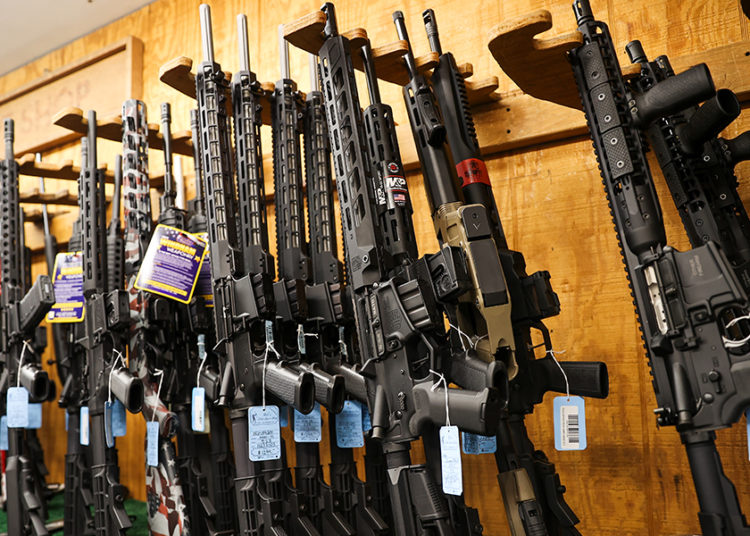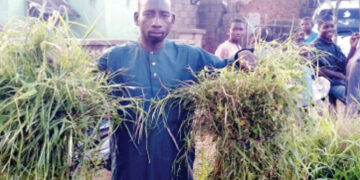The developed nations have been pushing for gun control in recent times following the widespread shooting of school children and other fun seekers by gunmen.
While the debate surges on the global stage, the governors of Benue, Katsina, and Zamfara states have increasingly sought to arm citizens against bandits and other non-state actors who attack and kill with little or no resistance at all.
Non-state actors have killed about 6,566 Nigerians between January and June 2022 while in 2021, gunmen killed up to 8,372 Nigerians.
Records showed that 45,000 Americans died in 2020 due to gun violence, in addition to 390 million guns in circulation in the United States as of 2018.
Former Chief of Defence Staff, Air Marshal Allamin Musa Daggash (Rtd) told LEADERSHIP Weekend that the Zamfara State government’s order to its citizens to procure arms for self-defence must have been out of frustration.
He added that the killings in Zamfara have continued with little or nothing to stop them.
Daggash said the nation’s democracy gives the governor the right to protect his people, adding that the federal government should challenge him if he is wrong.
“I think the poor man, the governor of Zamfara State, has been pushed to the wall. You know, the Zamfara crisis has kept increasing and the federal government has not helped him much. So, if you want to equate US democracy to Nigeria’s democracy, we are supposed to copy properly.
“The state too has a right to protect its people. So, there could be that kind of argument in the court. Even if the federal government wants to challenge him, he is not doing it intentionally or ordinarily. He is doing it because he is fed up with the whole crisis.
“Those guys come in multiple vehicles and motorcycles with guns almost every day and the federal government hasn’t done much. I think that is why he chose to toe that line. Let the federal government challenge him and tell him why he shouldn’t go ahead with the plan,” he said.
The former defence chief lamented years of abuse of law in the country, adding that even the government has over time failed to live up to its obligations hence the continued backlash.
“There have been abuses of the law. The government has over time failed to live up to its responsibilities but these are doable things; the issues of Fulani/Hausa and cattle rustlers and so on. These are things you can easily get to the bottom and find solutions to but no.
“We have gotten to the level that unless you will come out and find out who is behind what, you cannot properly correct the ugly trend. We have been going on with this bloody insurgency for 14 years now,” he lamented.
The former military chief lamented the level of corruption in the country, especially in the political arena.
“Imagine the billions of dollars spent during the last party primaries. As a leader, if you are seeing this kind of thing without doing anything, then you are condoning corruption.
“I’m, however, glad that bit by bit, people are fighting back corruption and illegality. The Zamfara situation is so sad. You see, it has become a total embarrassment to the governor himself,” he stated.
However, on May 3, 2021, President Muhammadu Buhari through an executive order, established the National Centre for the Control of Small Arms and Light Weapons (NCCSALW).
The centre’s mandate is to retrieve millions of small and light weapons circulating in Nigeria.
The NCCSALW, therefore, engaged civil society organisations (CSOs) on the need to curb the circulation of small arms and light weapons in the country with the view to bequeathing a peaceful Nigeria to the next generation.
In his address, the National Security Adviser, Major General Babagana Monguno (Rtd) lamented that despite the efforts being made, the global community was losing the war against transnationally organised crimes, terrorism, and trafficking of small arms and light weapons (SALW).
The NSA at the one-day strategic engagement with civil society organisations organised by the National Centre for the Control of Small Arms and Light Weapons (NCCSALW) with the theme: “Harnessing the Capacities of the Civil Society towards Promoting an Illicit Arms-free Society in Nigeria,” said 70 per cent of illicit arms in West Africa were in Nigeria.
“Today, numerous studies conducted by Small Arms Survey, OXFAM and the SBM Intelligence suggest that Nigeria is currently home to about 60-70 per cent of the 10 million illicit weapons believed to be in West Africa.
“This has already manifested as evidenced in the level of armed violence witnessed across Nigeria. These disturbing reports are, therefore, a call to action to roll back the menace of proliferation and reclaim our security space. This is a task that must be achieved,” he said.
Monguno, who was represented by his special assistant on Special Duties, Ambassador Ahmed Mohammed said illicit small arms and light weapons have continued to undermine global peace and significantly hinder development.
“Despite our best efforts, it has become apparent that West Africa, and indeed the global community, are losing the war to transnationally organised criminal networks, terrorist groups, domestic criminal elements, and weapons’ manufacturers who for various motives, choose to act outside the norms and dictates of all extant national laws and international protocols and conventions as they continue to keep the security space awash with illicit SALW.
“This we must not allow to continue. I am particularly delighted that the centre has established zonal offices which without doubt will drive our national effort closer to the people.
“We are gathered here today as partners, driven by a shared vision for peace and security in Nigeria and the region. We have gathered because the impact of the unbridled proliferation of SALW in Nigeria is of grave concern to every citizen or organisation that is represented here.”
He said the proliferation of SALW in many regions of the world and particularly West Africa, has become a major source of insecurity in the society as it fuels violent conflict, crime, and terrorism.
Nonetheless, he said that “while the threat and the use of SALW have been directly responsible for much of the untold human suffering in our society, it is important to emphasize that these weapons themselves do not cause conflict. Rather, it is the easy access to them and the simplicity of their use that makes violence more lethal and conflict more protracted.”
The National Security Adviser said small and light weapons have become weapons of choice for criminals, terrorists and bandits in Nigeria and beyond, posing a significant challenge to the country, especially in the wake of insecurity that has recently engulfed the Sahel Region, hence the need to stop the proliferation of the deadly weapons.
He added that it was against the backdrop of the proliferation of weapons and its attendant consequences, that President Muhammadu Buhari authorised the establishment of the National Centre for the Control of SALW “to serve as the institutional platform to stem the proliferation of small arms within the framework of the various international protocols and instruments to which Nigeria is committed. By this action, the President has further demonstrated Nigeria’s commitment to the provisions of Article 24 of the ECOWAS Convention on SALW which requires every member state to establish national institutions to promote a multilateral approach to stamping out illicit arms-trade in the sub-region.
He continued, “The efforts towards eradicating illicit arms globally has involved all stakeholders including the international and regional community, nations, states and most importantly, civil society groups.”
On his part, the national coordinator, NCCSALW Major General Abba Mohammed Dikko (Rtd) said the centre has made giant strides within the short time frame to achieve full operationalisation.
He restated that the proliferation of SALW has negatively impacted the peace, security and socio-economic wellbeing of the nation, adding that it has remained a key driver for terrorism, ethno-religious conflicts, violent separatism and sundry organised criminal activities within and across our borders.
He said Nigeria has borne the brunt of the instability in the Sahel region occasioned by the push-and-pull effect of arms trafficking.
“Consequently, Nigeria has closed ranks with her neighbours, ECOWAS and other international stakeholders over the years to eradicate illicit SALW in the hands of unauthorised persons or at least, halt their proliferation. Though the progress made in this area has remained a subject of debate, Nigeria has continued to tackle the challenge head-on,” he said
The coordinator said the centre has focused since its establishment on discharging its core function of providing a strategic platform for arms control in Nigeria through close partnership with stakeholders especially the Civil Society, both locally and internationally.
In conclusion, it is important to note that the best way to limit gun violence is by limiting access to guns by criminals. Government must live up to its responsibilities and provide real time security to citizens thereby winning their trust which is the only way Nigerians will willingly submit weapons otherwise, it will be an attempt in futility like several other failed policies by the government.





